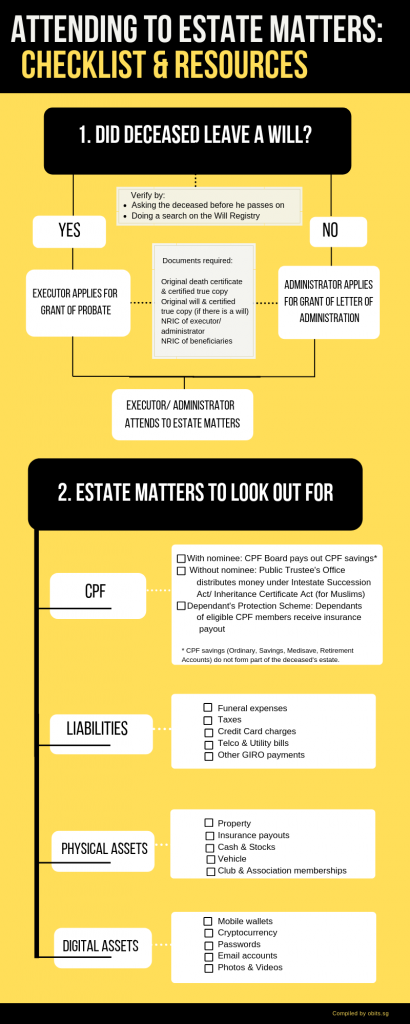Handling estate matters after your loved one dies.
After your loved one’s funeral, it is time to turn your attention to the deceased’s estate matters.
The estate refers to any assets the deceased owned at the time of his passing.
A direct way of finding out if your loved one had a will is to check with him while he was alive. If there was no chance to do so, you can also do a search with the Wills Registry in Singapore to find out if he had deposited his will there. The search will allow you to discover if he had left any last wishes and whether he named someone to carry out his instructions.
In Singapore, people generally engage a lawyer to draft a will. But individuals who are not legally trained may also be able to do so themselves
— provided they stick to the formalities required for a will to be valid. (See here for advice on how to write a will).
They can also
In order to help next-of-kin have a clearer idea on how to handle estate matters, we have compiled a checklist of items you will need to know about the process.
The infographic below is a summary of what a next-of-kin should look out for when handling last matters for the deceased, and what is considered part of a named executor or

If there is a will
In Singapore, a will is typically kept with a lawyer and would have been witnessed by two other people. The lawyer and the testator (the person who had the will made) can agree to have the will deposited with the Wills Registry (see the earlier section on what the Wills Registry does). The document will name the executor of the estate and contain instructions for how to distribute the assets of the deceased.
The executor’s duties include settling outstanding claims on the estate, pursue debts that may be owed to the estate, and distribute assets to beneficiaries.
The executor’s obligations may also include approaching government agencies and other institutions to notify them that the loved one has died in order to settle any outstanding claims.
Grant of Probate
The executor will have to apply for a grant of probate with the courts before he can carry out the instructions in the will.
To extract the Grant of Probate, you may need the following documents and information, where applicable:
- Original Will
- Original death certificate of the deceased
- Certified true copies of the Will
- Certified true copies of the Death Certificate
- NRIC of beneficiaries
- A list of assets. This list includes property (local and overseas), stocks and shares (local and overseas), vehicles owned by the deceased, club or association memberships, insurance policies, bank accounts, telco and utility bills.
- A Caveat search to determine there are no other claims made against the estate of the deceased
If there is no will
If there is no will, the family should make an application for a Grant of Letter of Administration to the courts. These papers serve as a court order to appoint an authorised person to administer the estate, resolve outstanding claims on the estate and distribute the assets according to the Intestate Succession Act.
Grant of Letter of Administration
The documents and information needed by an Administrator to apply for a Grant of Letter of Administration are similar to those required to apply for a Grant of Probate.
In practice, a probate lawyer can be engaged to provide guidance to
CPF Savings
CPF savings (Ordinary, Special, Medisave and Retirement Accounts) do not form a part of the deceased’s estate.
If a nomination had been made by the deceased, the CPF Board will get in touch with the nominee within 15 working days of being notified of the death to initiate the payout process.
If no nomination has been made, the Public Trustee’s Office (PTO) will be informed and the deceased’s CPF savings will be distributed to family members under the Intestate Succession Act or Inheritance Certificate Act (for Muslims). The administrator of the estate will have to make an online application for the PTO to handle the money.
The PTO takes about 4
Documents that are commonly required by the PTO are:
- Documents related to the deceased
- Original death certificate
- Certified true copies of the Death Certificate
- Marriage certificate of the deceased
- Decree nisi absolute (if the deceased was divorced)
- Documents related to the beneficiaries
- Birth certificates
- NRICs
- Death certificate of beneficiaries (if the beneficiary has died)
- Marriage certificate of the deceased’s parents
- Death certificate of parents (if they have died)
- Certificate of inheritance (for Muslims only)
- Bank statement or Front page of Bank Passbook with an account number for payment to be made electronically to the estate administrator
Insurance payouts
If the deceased was covered by the Dependant’s Protection Scheme (DPS), the CPF Board will contact his insurer (Great Eastern Life or NTUC Income) to notify them of the death and allow the claimant to trigger a claim application.
Besides the DPS, be sure to check for private insurance policies the deceased may have been covered by. Your loved one may have bought life insurance coverage in addition to the DPS, or health insurance policies that could let you claim payouts if your loved one suffered from a critical illness before death.
Insurance policies typically have named beneficiaries. If this is the case for your loved one, then the payouts would not be covered by his will. The executor or administrator should approach the insurance companies or the deceased’s insurance agent for more information.
Below is a resource list on how to make claims from some of the major life insurance companies in Singapore:
- Aviva
- AXA Insurance
- FWD Insurance
- Great Eastern Life Assurance
- HSBC Insurance
- Manulife Financial
- NTUC Income
- Prudential Assurance Company
- Singapore Life Insurance
- Tokio Marine Singapore
Property
If your loved one owned a property held in joint tenancy while he was alive, his share will be transferred to the surviving joint tenant.
If the property was held under a tenants-in-common scheme, and he had made a will, his share of the property will be distributed according to his will.
However, if there is no will, then his interest will be distributed according to intestacy laws.
If you would like to know the difference between a joint tenancy and a tenants-in-common scheme, you can read more here.
Resolving claims on the estate and distributing assets
A grant of probate or a grant of letter of administration from the courts will allow the executor or administrator to close accounts, transfer asset ownership and resolve claims on the estate.
The executor may approach financial institutions such as banks and government agencies for property loans, stocks and shares, LTA for vehicle ownership matters, IRAS for income tax matters, clubs and associations, the post office, utility services providers to resolve payments, pursue debts owed to the deceased and distribute assets to the beneficiaries of the deceased.
Here are some helpful links to some of these government agencies and service providers:
SP Group:
How to terminate SP Group account if account holder is deceased
IRAS:
Filing tax returns for the deceased
LTA:
How to transfer vehicle ownership if owner has died
SingPost:
Redirecting the deceased’s mail
A lot of government agency transactions happen online today. Your loved one may have had a SingPass account which he used to carry out some of these transactions.
Digital service providers
As Singapore goes digital, Singaporeans are increasingly conducting personal and financial matters online.
A survey of Singaporeans’ digital habits in 2018 showed that about nine out of 10 Singaporeans engaged in online banking and finance activities at least once a month. (Savvy Singapore, Decoding a Digital Nation).
Stop recurring credit card charges
Digital assets run the gamut from personal photos and videos to online accounts that may have a monetary value attached to them, or accounts that incur credit card charges on a regular basis.
It will be good to find out which online accounts are linked to the deceased’s credit cards and instruct the service provider to stop further charges.
Increasingly c
Email accounts, online banking accounts, mobile wallet platforms, social media accounts, cloud storage, streaming services and even cryptocurrency form your loved one’s digital estate.
If the deceased subscribed to certain premium services, the executor or administrator may have to notify the providers and show proof of death to stop these services and not incur further charges.
The following are some popular digital service providers and the information required to terminate an account.
- SingPass – GovTech, the agency which manages the SingPass system, says that an account that has not been logged in for a prolonged period of time will become dormant. However, the account is not removed.
- Dropbox – Send an email to Dropbox to close the account
- Streaming and online subscription services:
- Spotify – The account cannot be transferred. Write to Spotify to cancel the account.
- Netflix – The account can be terminated after your loved one passes away. The executor will require the email and password to log in and cancel the membership.
- Paid subscriptions to any SPH products (The Straits Times, The Business Times, Lianhe Zaobao or Berita Harian) – Call the SPH Customer Service Hotline 6338 3838 or email [email protected] for assistance.
- iCloud – The account cannot be transferred and will be closed upon notification of death.
Click on this link for more online accounts and how you can close them.
If the deceased left instructions and provided access to these accounts, the executor will be more empowered to act on his behalf. This could also prevent identity theft or fraud in cyberspace.
Otherwise, the executor may have to follow up with these service providers to the best of his knowledge or even check through paperwork or any digital trails the deceased may have left behind.
If your loved one was somewhat digitally-savvy, we have listed some assets below that may have been maintained by him as a checklist for your reference:
Emails:
Popular email service providers have different policies for handling accounts after an account holder dies.
Google allows Gmail accounts to be deleted, so no one will be able to access that email or username. An account holder can also activate the “Inactive Account Manager” option for his entire Google account, including the Gmail account to share parts of the account with a trusted contact if there has been no activity for a certain period.
Other data that can be shared include the YouTube account, Google photos and contacts.
If there is no sign-up to an Outlook account at least once a year, Microsoft will close the Outlook account.
To close a Yahoo! account, the executor must email the provider to close a user’s account if no instructions are left by the deceased. Yahoo! does not allow access to any of the user’s contents.
Social media:
A Facebook account can either be closed forever or memorialised.
When Facebook is informed of a death, the deceased’s account will be permanently erased, and no one will be able to view the profile again. If an account holder dies before the account can be closed, family members should provide documentary evidence, such as a certified copy of the death certificate, an obituary, or the last will, to Facebook of the death for the account to be closed.
Alternatively, Facebook allows account holders to choose someone they trust to be their legacy contact. Account-holders can choose to have their profile memorialised and their legacy contacts will be able to change the profile photo, archive posts and pictures without seeing personal messages after Facebook is notified of the death.
Instagram has similar policies to Facebook, with options to close an account forever or memorialise it.
Twitter accounts can only be deactivated after their users die, with proof in the form of a death certificate or an obituary.


Thanks for the above very helpful information.
i don’t have a printer. Could a copy be sent to my email?
Appreciate.